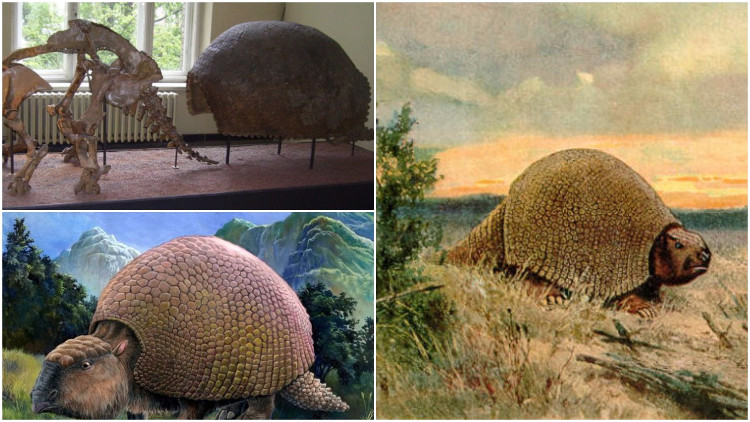The discovery of fossilized animal fossils dating back 600,000 years
Argentine archaeologists announced on April 17 that they have discovered the fossil of a family of Glyptodon (600-year-old teeth) dating back to 600,000 years, preserved almost intact in the city of San Pedro, the way of defense. Buenos Aires, 170 km northwest.
José Luis Aguilar, director of the Buenos Aires Provincial Paleontological Museum, said it was the third discovery of the Glyptodon fossil this month in Argentina, and confirmed the samples of ancient organisms died in the middle Pleistocene. , about 600,000 years ago.

Glyptodon species.(Source: Thevintagenews.com).
The location, bones and surrounding features of those giant fossils will help research experts recreate the scene that took place in prehistoric times in Buenos Aires.
Mr Aguilar said a Glyptodon is likely to have died of being stuck in the swamp while the other two ancient specimens were eaten by other animals, due to an intact 99% fossil and joint bones. Its all connected.
Glyptodon is the apricot species in the family Glyptodontidae . This is a large herbivore, the ancestor of Armadillo with a long evolutionary history, living in South America for 35 million years until extinction about 10,000 years ago.
Last month, archaeologists also discovered fossils of 50 million-year-old animals and plants at the foot of El Fresco in Puelen town, La Pampa province, more than 1,000km from Buenos Aires.
Earlier this month, the Argentinian archaeological team began restoring the fossil remains of a Glyptodon of the type of Doedicurus Clavicaudatus, the largest Glyptodon that lived 24,000 years ago, found in the area of Mar Chiquita, 380km from Buenos Aires.
During the past decade, many fossils of Glyptodon, giant lazy (megatherium) and mastodon (mastodon) have been discovered in Argentina's Pampa province.
- Detecting fossilized animal fossils dating to 16,000 years in Uruguay
- The discovery of animal fossils dating to 42 million years in Brazil
- Excavation of extinct animal fossils in Lang Son
- Australia: Fossilized a fish species dating back 380 million years
- Discover the oldest animal fossils
- People in Kien Giang possess three fossil samples dating back millions of years
- Discover the oldest animal in Earth
- Mexico found fossil fish dating back 110 million years
- China discovered skull fossils almost completely
- Australia found fossils tens of millions of years old
- 300 samples of ancient fossils
- The discovery of new ancient human fossils from more than 3 million years ago
 Discovered an ancient centipede fossil 99 million years old
Discovered an ancient centipede fossil 99 million years old Discovered bat-like dinosaurs in China
Discovered bat-like dinosaurs in China Discovered a 200-year-old bronze cannon of the coast
Discovered a 200-year-old bronze cannon of the coast Discover 305 million-year-old spider fossils
Discover 305 million-year-old spider fossils